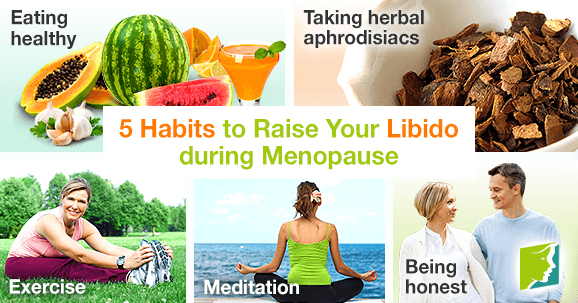Loss of libido can be very concerning during menopause. You may become nervous that your romantic “spark” with your partner is faltering. However, this is a very common occurrence during the menopause transition, and it is not an indication of your sexual and emotional feelings towards your significant other, but rather a temporary physical change in your sex life.
Lower levels of sex hormones such as estrogen, progesterone, and testosterone can cause unfavorable changes likes reduced sex drive and arousal. However, there are many ways to overcome this and get yourself wanting your partner again and again.
1. Eating Healthy
In general, you should be getting a well-balanced diet. Get a blood test to make sure you're not low in vitamins B, C, D, and E, as these are important for sex.
Otherwise, focus on eating foods that encourage sexuality. Garlic, for example, is thought to increase blood flow to the sex organs, which can provide better lubrication and sensitivity. Fruits rich in vitamin C, like papaya, are also great for fighting fatigue and getting you ready.
2. Taking Herbal Aphrodisiacs
There are also medicinal herbs have been used for millions of years to improve sexual appetite. One of them is yohimbe. This bark hails from West Africa. The active alkaloid, yohimbine, increases circulation to the sex organs and even activates areas in the brain responsible for sexual desire.
3. Exercise
Sexual problems can often be related to a lack of physical activity. It's highly recommended that you get three hours of physical activity a week to help restore libido. Cardio is great for boosting your mood and improving circulation. Yoga is also great for getting more in touch with your body, breaking through anxiety, and gaining flexibility.
Also, Kegel exercises help increase libido. They are focused specifically on the pelvis and help strengthen the vagina through muscle contraction and release. This can support greater sensitivity and stronger orgasms.
4. Meditation
Stress will distract you from sex. It is true during menopause and it is true during any other time in life. It is essential for your thoughts to be focused on your partner rather than worrying about a million other things.In order to maintain concentration, calm your muscles, and enjoy intimacy, practice meditation. Even just 15 minutes per day is enough to relieve anxiety. Inhale deeply into your belly for five seconds, then completely release any worries you're holding onto for five seconds. Next time, focus on releasing muscle tension. Continue this alternation with closed eyes and ambient music.
5. Being Honest
Finally, be open. Don't keep your worries and challenges to yourself - express what you are going through to your partner. Also, open a sexual dialogue; talk about your fantasies and desires. Even if you can't have sex, continue to be affectionate as ever - be touchy because it sends a strong sexual cue to your body.
Instead of giving up this healthy and loving activity, rise above the discomfort to rediscover your sexuality. It may be a bit different during this time, but it is as present as ever.
Sources
- Better Health Channel. (2013). Menopause. Retrieved March 27, 2014, from http://www.betterhealth.vic.gov.au/bhcv2/bhcarticles.nsf/pages/Menopause?open
- National Institutes of Health. (2013). Physical Activity. Retrieved March 27, 2014, from http://www.nlm.nih.gov/medlineplus/ency/article/001941.htm
- National Institutes of Health. (2013). Vitamin C. Retrieved March 27, 2014, from http://ods.od.nih.gov/factsheets/VitaminC-HealthProfessional/
- Trafton, A. (2011). The Benefits of Meditation. Retrieved March 27, 2014, from http://web.mit.edu/newsoffice/2011/meditation-0505.html
- University of Maryland Medical Center. (2013). Garlic. Retrieved March 27, 2014, from https://umm.edu/health/medical/altmed/herb/garlic



